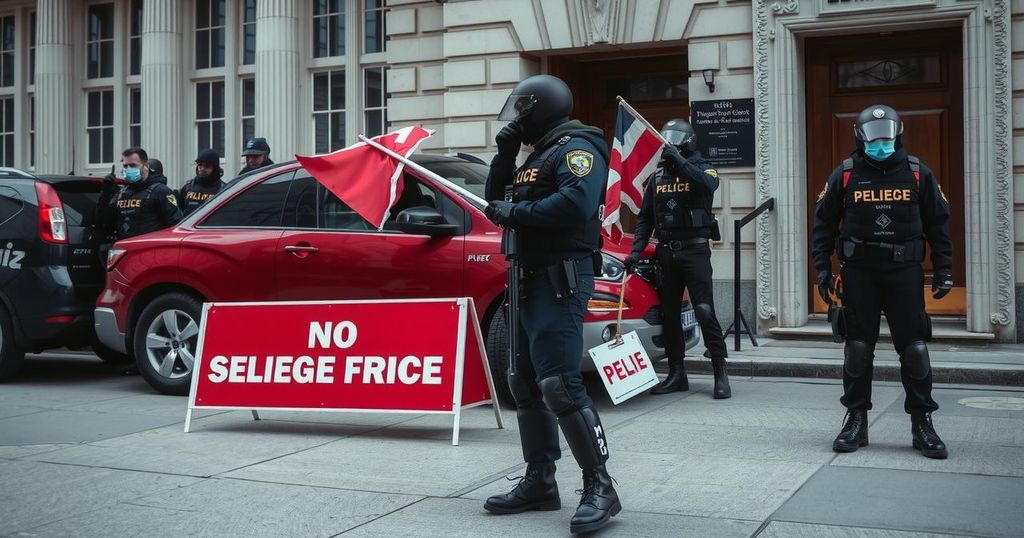Five Venezuelan opposition figures in Argentina’s Embassy report being without electricity for over a month, claiming a ‘siege’ by the Maduro government. The activists have faced significant human rights violations, including power and water supply disruptions. This diplomatic crisis further strains Argentina-Venezuela relations amid allegations of political repression and terrorism charges against an Argentine national.
Five Venezuelan opposition leaders currently seeking refuge in Argentina’s Embassy in Caracas have reported ongoing hardships, notably the absence of electricity for over a month. They contend that this constitutes a government-imposed ‘siege’ under President Nicolás Maduro’s regime. These political figures, who have been in the Embassy since March, face arrest on charges related to alleged attempts to destabilize the nation. According to Magalli Meda, an advisor to opposition leader María Corina Machado, the lack of power has transformed the Embassy environment into what she describes as an ’embassy prison.’ Water supplies have also been disrupted, exacerbating their plight.
In contrast, Venezuelan Interior Minister Diosdado Cabello refutes claims of a siege, attributing the utility cuts to overdue service payments. Furthermore, a sixth opposition figure, Fernando Martínez Mottola, who had also taken refuge in the Embassy, surrendered last week and is now under conditional release. The opposition continues to assert that their candidate, Edmundo González Urrutia, rightfully won the presidential election held on July 28, despite the electoral commission’s declaration of Maduro’s victory, a result challenged by numerous countries.
Relations between Argentina and Venezuela have deteriorated further, particularly following the departure of Argentine diplomatic personnel from the Embassy in August, prompted by President Javier Milei’s criticisms of the Venezuelan electoral process. Meda has claimed that the Maduro government obstructs diplomatic visits, stating, ‘No ambassador has come to this Embassy, not one,’ indicating that foreign diplomats have been threatened with expulsion should they engage in the situation. This incident has added tension to already strained Argentina-Venezuela relations, further aggravated by the recent arrest of an Argentine Border Guard officer, Nahuel Agustín Gallo, in Venezuela on terrorism charges, which his family contends stemmed from a routine visit to see his family.
The situation in Venezuela remains precarious, characterized by intense political strife and economic hardship. Opposition groups continue to contest the legitimacy of President Nicolás Maduro’s government, particularly following contentious elections. The ongoing conflict has led political figures to seek refuge in foreign embassies, underscoring the severe climate for dissenters within the country. Argentina’s relationship with Venezuela has worsened recently, notably affecting diplomatic interactions and the welfare of those seeking asylum within its embassies. The case highlights broader issues regarding human rights, state repression, and international relations in South America.
In summary, the plight of the Venezuelan opposition figures confined in Argentina’s Embassy underscores the oppressive conditions faced by dissidents under Nicolás Maduro’s government. Their claims of a siege, marked by utility disruptions, reflect significant human rights concerns. Additionally, the developments draw attention to the deteriorating diplomatic relations between Venezuela and Argentina amidst rising tensions, particularly following controversial allegations regarding the arrest of an Argentine officer in Venezuela. The subtext of these events reveals the intricate dynamics of political asylum and international diplomacy in a region grappling with authoritarian governance.
Original Source: www.batimes.com.ar






